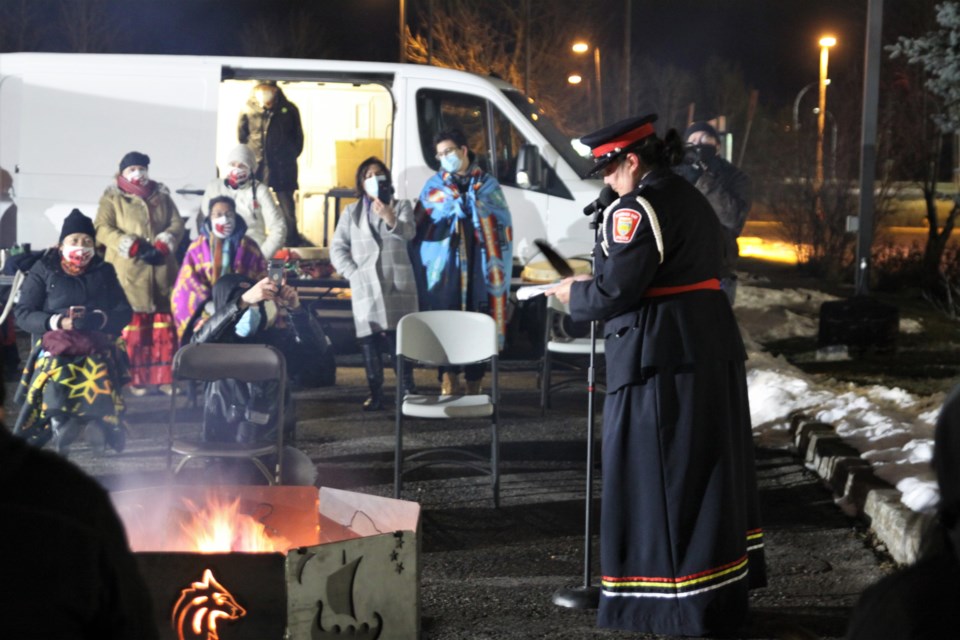THUNDER BAY – Two trees were illuminated with thousands of lights Sunday in a ceremony honouring Missing and Murdered Indigenous Women and Girls (MMIWG), held at the Thunder Bay Police Service headquarters on Balmoral Street.
That the Tree of Hope ceremony went forward in its second year under the shadow of the COVID-19 pandemic was a testament to the determination of participants to keep the issue front and centre, organizers said.
The project, spearheaded by Const. Sharlene Bourdeau, aims to raise funds to help solve an MMIWG case (though fundraising was put on hold this year due to the pandemic).
Bourdeau said Sunday it was just as important to show family and friends of the missing and murdered that they had not been left behind.
“I just don’t want people to forget,” she said. “I feel so bad for the surviving family members and friends, because they feel that they grieve alone – but they don’t grieve alone. If they’re grieving, the community’s grieving.”
Leaders representing the City of Thunder Bay, Fort William First Nation, Ontario Native Women’s Association (ONWA), Nishnawbe Aski Nation (NAN), and local police and firefighters attended the ceremony Sunday evening, which was held by invitation only due to COVID-19.
Participants tossed more than 4,000 tobacco ties into a sacred fire to symbolize the estimated number of MMIWG in Canada.
After last year illuminating 1,200 lights to represent the total number of MMIWG cases opened by the RCMP, a second tree was lit with another thousand lights this year. The goal is to eventually light four trees in front of the police station, representing all MMIWG, as the campaign grows.
NAN grand chief Alvin Fiddler said too many families of the missing and murdered still felt ignored, and criticized the federal government’s handling of the MMIWG inquiry, which released its report containing more than 200 recommendations in 2019.
The federal government failed to meet its June 2020 deadline to release an action plan based on the report, blaming COVID-19 for the delay. That has drawn criticism from the inquiry’s commissioners and Indigenous women’s organizations across the country.
Coralee McGuire-Cyrette, ONWA’s executive director, agreed more action was needed.
“We want to see that the federal and provincial governments make Indigenous women a priority during the pandemic,” she said. “The only way we’re going to be able to make any change is by action. We need to see action now, we need to see investments towards Indigenous women’s safety and healing coming out of the pandemic.”
McGuire-Cyrette highlighted a report the organization issued in October, containing a comprehensive vision for action on the issue.
Organizers also highlighted the goal of solving unresolved cases, with Bourdeau calling for anyone with knowledge of a case to break their silence.
“The police cannot do it alone, it’s a very difficult job when you investigate something like this,” she said. “What I’m asking the general public to do is, if you have any tip, even though it may seem very insignificant and small to you – a lot of the times with some of these cases, that’s the last piece of the puzzle police need.”
The campaign aims to eventually raise $50,000, which would be used as a reward for information leading to an arrest in an MMIWG case.
Bourdeau, an Indigenous woman who has been with the Thunder Bay police for nearly 30 years, acknowledged an often difficult relationship between police and the Indigenous community, but said a common determination to move forward could be a uniting force.
“I believe everybody has a common thread, despite the fact that people have their differences,” she said. “We’ve all come together… to try to help solve these cases.”
McGuire-Cyrette called the ceremony a vital recognition of the responsibility to change an unacceptable situation.
“Working together on addressing the violence Indigenous women and girls face is critical to changing the story, to recognize that Indigenous women and girls are not safe in our community, and the community is stepping up to do something about it.”
